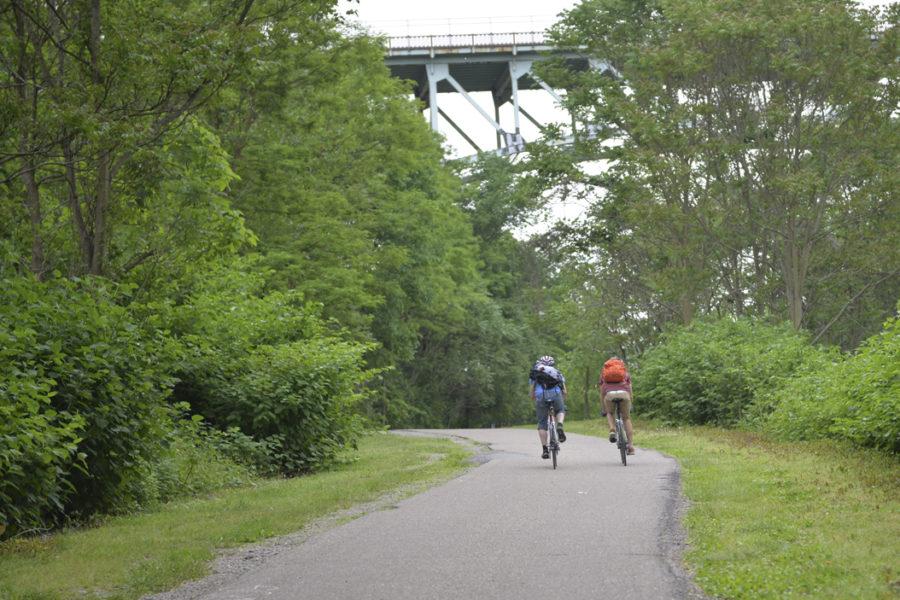Pitt Sustainability Challenge invites students, staff to advance carbon neutrality on campus
Bikers ride on the Three Rivers Heritage Trail.
January 20, 2023
Pitt has implemented smart and sustainable projects across its campus in recent years, such as the Pitt Bike Cave and solar-powered study tables on the Posvar Patio. As greenhouse gas emissions continue to rise, Pitt is taking on new initiatives to make the University more sustainable and conscious of its carbon footprint.
Pitt announced its plan to become carbon neutral by 2037 in February 2020. The plan outlines a push to reduce greenhouse gas emissions with sustainable initiatives targeting areas such as building efficiency and renewable energy.
The Pitt Sustainability Challenge is now reaching out to Pitt students, faculty and staff to share “impactful and durable” project ideas to achieve carbon neutrality on campus. External nonprofit and for-profit organizations are also encouraged to participate and to submit proposals. The challenge began in December 2022 and the Selection Committee will announce the finalists in September 2023.
According to their website, the most promising solution to advance carbon neutrality will receive a $300,000 grant. Pitt Sustainability Challenge will execute the winning solution between winter 2023 and winter 2025.
Aurora Sharrard, executive director of sustainability, said the main goal of the challenge is to ensure that Pitt students, faculty and staff have the resources and support to “advance ideas for impact.”
“The Pitt Sustainability Challenge encourages Pitt members to think big, envisioning a bolder and greener future for Pitt,” Sharrard said.
Meredith Felde, a member of the Fossil Free Pitt Coalition, said she supports the challenge’s effort to increase carbon neutrality.
“Obviously, we are pro-carbon neutrality,” Felde, a junior sociology major, said. “We think that’s a great initiative and we definitely support the people working towards that.”
FFPC staged several sit-ins outside Chancellor Patrick Gallagher’s office in the Cathedral of Learning to protest Pitt’s “anti-environment” investments last semester. Felde worries that the sustainability challenge sends a “clouded” message about the University’s intentions to make their endowment completely carbon neutral.
“We just find it really kind of upsetting that the University isn’t taking their dominance seriously, and that they don’t really want to open a dialogue with the community and students and faculty about the endowment,” Felde said. “But by creating the sustainability challenge, they’re making it appear as if they’re really open about their finances.”
Nick Suarez, another member of the coalition, also believes that Pitt’s pledge to carbon neutrality is a step in the right direction but not enough to make a lasting impact.
“Even though the people working on it are doing an admirable job, the gesture itself of carbon neutrality by 2037 is far too little, far too late,” Suarez, a graduate student in physics, said.
The Pitt Sustainability Challenge wants to provide a sense of community, sustainability and collaboration across campus in its efforts to reduce the dangers of carbon emissions, according to Gena Kovalcik, co-director at the Mascaro Center for Sustainability. She said students and community members can also practice sustainability daily by following Pitt’s Green Guide. Involvement in student organizations and projects, such as Plant2Plate Student Garden and Pitt Green Fund, which are other ways students can work to promote sustainability and environmental engagement on campus.
“The Pitt Sustainability Challenge is one of many opportunities for students and employees to incorporate sustainability into their daily lives, academic and professional work, extracurricular activities and service interests at Pitt,” Kovalcik said.
Sharrard said the Pitt Sustainability Challenge will bring a sustainable solution to the Pitt community that is both beneficial and durable.
“We are inviting innovative solutions that advance carbon neutrality, yet are grounded in an understanding of local conditions that are ambitious, yet achievable,” Sharrard said, “that show the greatest potential to realize measurable benefits for the Pitt community.”








